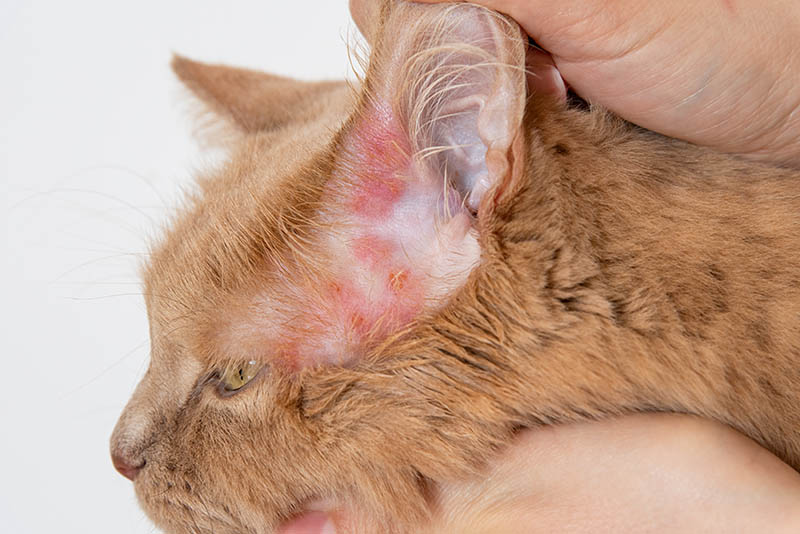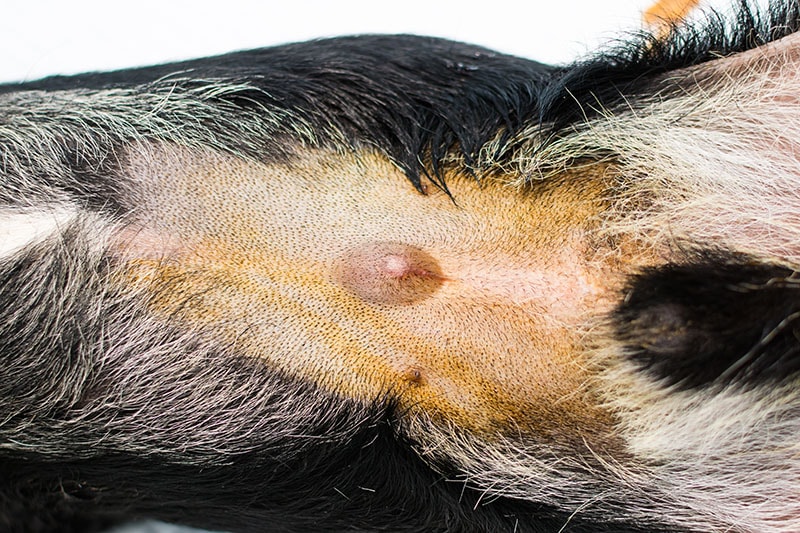FIV in Cats: Signs, Causes & Care (Vet Answer)
Updated on
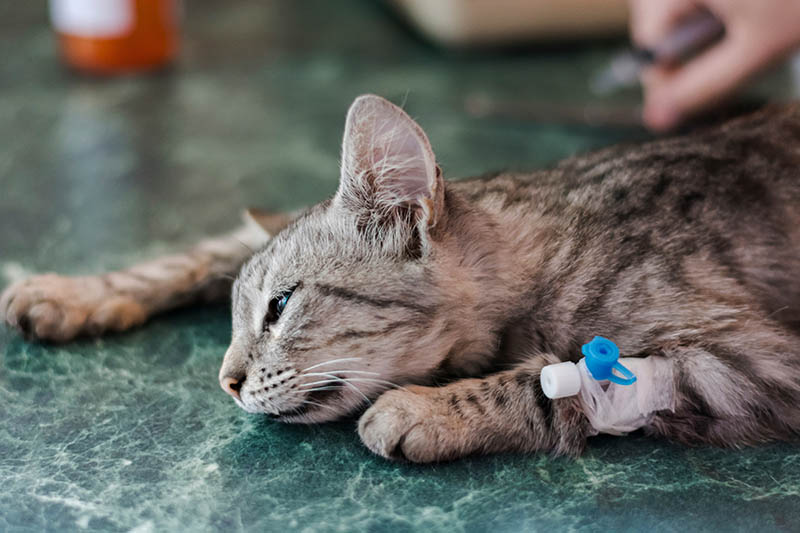
Click to Skip Ahead
Feline immunodeficiency virus (FIV), is a contagious viral disease that weakens a cat’s immune system over time, making them more susceptible to illnesses. It is estimated at 2.5-5% of healthy cats in North America are FIV positive (FIV+). Cats can remain asymptomatic for months to years whereas others can go on to develop the terminal phase of the disease where they can develop severe illness. The terminal phase of FIV is occasionally referred to as feline AIDS. Although FIV+ patients have a diminishing immune system, a large portion of affected cats can have a normal life expectancy due to the long subclinical phase. Once a cat is infected with FIV, they will be affected for life, therefore prevention, early identification, and supportive mechanisms are the cornerstone of patient care
What is FIV?
Feline immunodeficiency virus is a retrovirus that causes a weakened immune system in cats, similar to HIV that occurs in humans. FIV can be found throughout the world, however there are different subtypes present geographically, with varying levels of severity.
Feline immunodeficiency virus is transmitted to cats through contact with infected fluids. By far, the most common route of transmission is through contact with infected saliva. This generally occurs through fighting, and very rarely through grooming, and sharing of bowls. The virus can be spread to kittens in-utero or from nursing from an FIV+ queen. Blood transfusions have also been noted as a possible route of infection.
Once infected with the feline immunodeficiency virus, cats remain infected for life. Cats can experience a happy and healthy life, or they can go on to develop illness secondary to their slowly depleting immune system.
Once a cat has become infected with the virus, viral replication begins. The virus will slowly decrease lymphocytes, a particular type of white blood cell. Not only are the numbers of lymphocytes impacted, the ability for lymphocytes to respond to infection is also lessened. The slow depletion of lymphocytes negatively impacts a patient’s ability to mount an immune response when challenged.
There are different phases to an FIV infection. Not all cats will experience all phases, and it is important to note, that not all cats will go on to develop AIDS.
1. Acute Phase
Shortly after the virus is introduced to the feline, the cat’s immune system is alerted, and an inflammatory reaction occurs. During this time, the cat produces antibodies against the virus. The infected cat may show temporary signs of illness including fever, lethargy, and lymph node enlargement. This phase can often go unnoticed by pet owners.
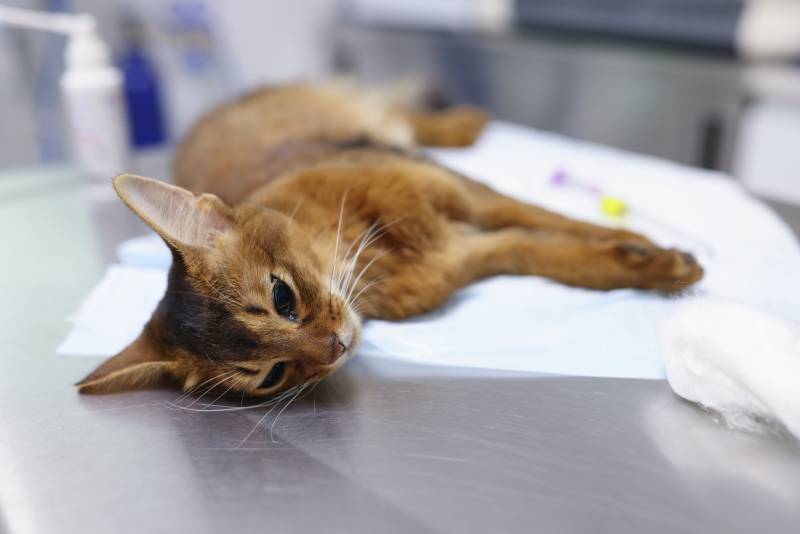
2. Asymptomatic Phase
After the patient’s body responds to the virus by creating antibodies, the patient enters into a asymptomatic stage where clinical signs of illness are not apparent. During this time, the virus is still at work invading lymphocytes and slowly weakening the immune system. This stage has the potential to last for years.
3. Progressive/Terminal
As the affected cat’s immune system continues to be weakened, their bodies will be less able to adequately fight infection. During this stage, cats become very susceptible to intermittent or reoccurring infections. Cats can develop several comorbidities, cancer, severe secondary infections, or potentially neurologic signs. The terminal stage in which severe clinical disease is present is referred to as feline AIDS. Patients who have reached this stage have a poor prognosis.
What Are the Signs of FIV?
Depending on the phase of viral infection, signs of illness may be absent. Cats with clinical signs of illness associated with AIDS may experience:
- Stomatitis (inflammation of structures within the oral cavity)
- Lethargy
- Fever
- Reoccurring/difficult to clear infections
- Weight loss
- Decreased appetite
- Lymph node enlargement
- Seizures
- Respiratory, skin, and ocular infections
- Diarrhea
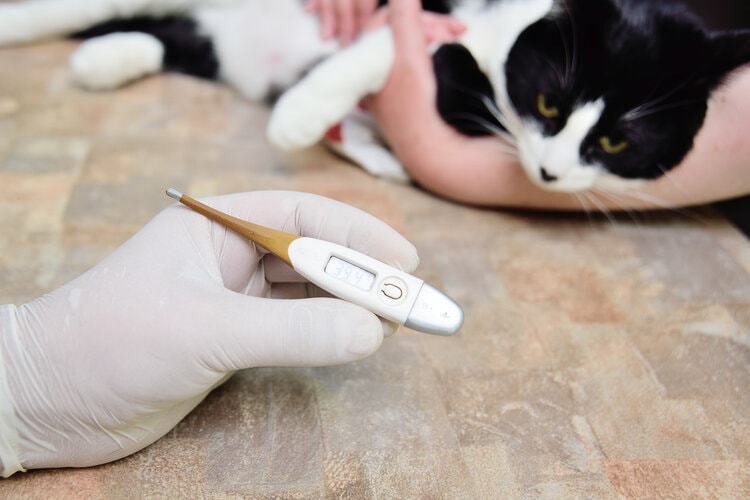
Diagnosing FIV in Your Cat
Since patients with FIV can be asymptomatic for a long period of time, routine screening is important as it is the most common way a diagnosis of FIV is made. The most common diagnostic test is the ELISA test as it detects FIV antibodies in blood.
Below are situations in which testing is appropriate.
- Kittens should be tested between 8-12 weeks of age. If kittens are positive, they should be retested every month until over 6 months of age to confirm positive FIV status, and not just detectable antibodies from the queen
- Cats that have a recent fight history should be screened at a minimum of 2 months after an altercation occurs. Intact, male adult cats tend to be the most likely to be infected due to their increased chances of fighting
- Outdoor cats or cats that share a home with FIV positive housemates should be screened annually
- Prior to adding additional cats into a household with cats, all parties should be screened. During the initial introduction between cats is the time in which aggressive behaviors are more likely to occur
- Clinically ill cats should be screened for FIV, even if previously determined to be negative
If a patient has tested positive on an initial ELISA test, a confirmatory PCR test may be pursued which identifies viral DNA within blood.
Routine laboratory bloodwork may show lower than normal levels of white blood cell and in some cases, elevated globulin (protein) levels.

How Do I Care For A Cat With FIV?
Having a cat diagnosed with FIV can be worrisome. Fortunately, many FIV+ cats can have normal life expectancies, experiencing years without signs of illness with appropriate precautions. It is important to note that patients cannot be cured of FIV.
Lifestyle changes should be made to accommodate a FIV+ cat. It is recommended to keep all FIV+ cats indoors to reduce the likelihood of transmission via fighting, but also to reduce possible contact with opportunistic pathogens.
Routine veterinary examinations are recommended for FIV+ cats every 6 months. High-quality diets and preventative care measures including flea/tick prevention will be discussed with your veterinarian during these appointments. Signs of illness noted in a cat with FIV should be promptly addressed as they are more susceptible to significant sickness. Cats with FIV are prone to stomatitis, which is inflammation of the oral cavity due to normal bacteria living in the mouth. Due to stomatitis risk, routine prophylactic dental care is recommended which may include dental cleanings.
Your veterinarian will be able to discuss vaccination recommendations based on your cat’s age, previous vaccine history, and phase of infection. If a vaccine is warranted, an inactivated form should be administered when possible.
Although a cure is not possible, your veterinarian may also discuss the pros and cons of alternative therapies including antiviral treatment.
Prevention of Infection
Although there was a vaccination available against FIV, it is no longer available in the United States. The vaccine was an adjuvanted vaccine that needed to be boosted annually to offer adequate protection. Adjuvanted vaccines have been associated with vaccine-related sarcomas and are avoided when possible. The FIV vaccine did not offer protection against all subtypes which meant incomplete coverage. To further complicate matters, vaccinated cats would test positive on routine ELISA screenings making it difficult to distinguish between true infection versus immunizations.
Prevention is focused on reducing or eliminating chances of exposure to FIV+. This is achieved by keeping cats indoors, spaying/neutering, and being mindful of cat-to-cat interactions.
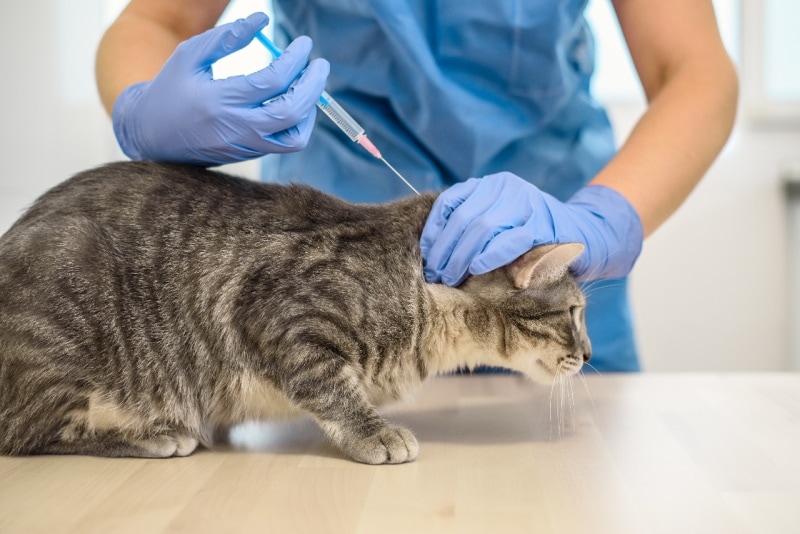
Frequently Asked Questions
Does my recently diagnosed FIV+ cat need to be euthanized?
An FIV+ cat can live a long, and happy life. Precautions should be taken to minimize the spread of disease between cats through spaying/neutering and keeping them indoors. Additionally, it is important to have any signs of sickness noted in your FIV+ companion addressed quickly.
Will my FIV+ cat develop AIDS?
Not all cats that have contracted the feline immunodeficiency virus will develop the symptomatic form of illness referred to as AIDS. Cats with FIV can remain symptom-free for prolonged periods of time.
Is the term FIV interchangeable with AIDS?
Although the terms have been used interchangeably, they are NOT the same thing. FIV refers to the name of the virus that causes AIDS. The term AIDS is used to describe the condition of immune compromise that develops and that presents with signs of illness. Not all cats that have FIV will progress to having AIDS.
Conclusion
HIV is a virus that is spread between cats, most often through fighting. The virus causes a weakened immune system in affected cats, leading to increased disease susceptibility during the progressive/terminal phase. Although terminal diseases can occur, many cats are able to live full lives with proper supportive care and lifestyle changes.
Featured Image Credit: Fordvika, Shutterstock




